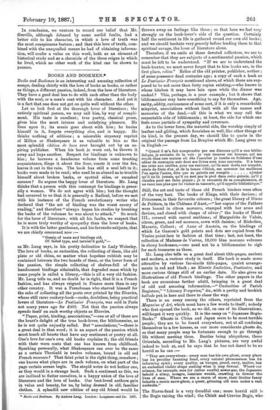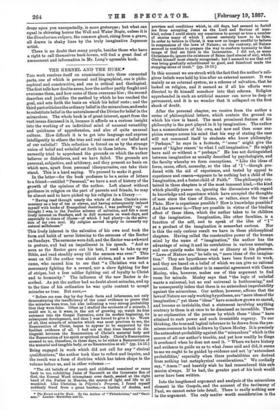BOOKS AND BOOKMEN.* Books and Bookmen is an interesting and
amusing collection of essays, dealing chiefly with the love of books as books, or rather as things, a different passion, indeed, from the love of literature. They have a good deal less to do with each other than the body with the soul, or a man's coat with his character. And yet it is a fact that one does not get on quite well without the other.
Let us look first at the thorough lover of literature; the entirely spiritual person, we may call him, by way of compli. ment. His taste is excellent ; true poetry, classical prose, gives him the most intense and satisfying pleasure. He lives upon it ; its music goes about with him ; he buries himself in it, forgets everything else, and is happy. He thinks nothing of editions ; a miserable sixpenny reprint of Milton or Shakespeare is as valuable to him as the-
moat splendid edition do luxe ever brought out by an as. piring publisher. When his book is worn out, he throws it away and buys another. Respect for bindings is unknown to him ; he borrows a handsome volume from some trusting acquaintance, flings it about the floor, roasts it over the fire, leaves it out in the rain. The book has still a soul left in it; books were made to be read; who need be so absurd as to trouble himself about broken backs, or spotted sides, or smashed
corners ? So argues the happy lover of literature. Mr. Lang thinks that a person with this contempt for bindings is gener- ally a woman. We do not agree with him; but the thought had occurred to us that it is generally a Radical, before we met with his instance of the French revolutionary writer who declared that "the art of binding was the worst enemy of reading," and therefore "always began his studies by breaking the backs of the volumes he was about to attack." So much for the lover of literature; with all his faults, we suspect that he is more truly worthy of sympathy than the lover of books.
It is with the latter gentleman, and his favourite subjects, that we are chiefly concerned now :—
" Gossip of texts and bindings old, Of faded type, and tarnish'd gold,"— as Mr. Lang says, in his pretty dedication to Lady WolseIey. The love of books, as curiosities, the collecting of them, like old plate or old china, no matter what hopeless rubbish may be contained between the two boards of them, or the lower form of the passion, the simple collecting of shelves-fall of the handsomest bindings attainable, that degraded mass which by some people is called a library,—this is all a very old fashion. Mr. Lang tells us, and no doubt he is right, that it is a French fashion, and has always reigned in France more than in any other country. It was a Frenchman who starved himself for the sake of collecting all the poets ever printed by the Elzevirs, whose still rarer cookery-book—cooks, doubtless, being practical lovers of literature—Le Pastissier Francois, was sold in Paris not many years ago for 2400. Not that the passion always spends itself on such worthy objects as Elzevirs.
"Paper, print, binding, associations,"—one or all of these are the heart's delight of the true book-lover, the bibliomaniac, as he is not quite unjustly called. But "associations,"—there is a great deal in that word; it is an aspect of the passion which must touch all hearts that have any sentiment or poetry at all. One's love for one's own old books explains it; the old friends with their worn coats that one has known from childhood. Speaking personally, what Shakespeare can ever be the same as a certain Theobald in twelve volumes, bound in old red French morocco ? That faint print is the right thing, somehow ; one knows what plays are in each volume, on what part of the page certain scenes begin. The stupid notes do not bother one, as they would in a strange book. Such a sentiment as this, we are inclined to flatter ourselves, is a happy union of the love of literature and the love of books. Our best.loved authors gain in value and beauty, for us, by being dressed in old, familiar clothes. A splendid new edition of any old friend would be
• Books and Boohnen. By Andrew Lang. London: Longman:land Co. UM.
thrown away on feelings like these ; so that here we feel very strongly on the book-lover's side of the question. Certainly half the sentiment in life is gathered round our own old books ; and we should hesitate very gravely before lending them to that spiritual savage, the lover of literature alone.
Therefore, if we smile at these devoted collectors, we are to remember that they are subjects of a sentimental passion, which must be felt to be understood. "If we are to understand the book-hunter, we must never forget that to him books are, in the- first place, relics." Relics of the old printer, publisher, author ; of some possessor dead centuries ago; a copy of such a book as Le Pastissier FranpoLs mentioned above, of which there are sup- posed to he not more than forty copies existing,—who knows in whose kitchen it may have lain open while the dinner was cooked ? This, perhaps, is a poor example ; but it shows that bibliomaniaes may have something to say for themselves. Age, rarity, oddity, cariousness of some sort, if it is only a remarkable misprint, associations without limit with all the names and memories of the dead,--all this is what we may call the respectable side of bibliomania ; at least, the side for which one feels some particle of sympathy and reverence.
As to the lower form, the material side, the worship simply of leather and gilding, which flourishes so well, like other things of its kind, in the present day, we should like to quote in the- original the passage from La Bruy ere which Mr. Lang gives as in English:—
" Quaud ii m's fait comprendre par sea disconrs gull a nne biblio- thhque, je sonhaite de Is voir je vale tronver eat homme, qui me recoit dans use maison oh des rescalier je tombs en foiblesse (rune odeur de maroquin noir dont see livres aunt tons converts. II a beau me Crier our males, pour me ranimer, Tells soot dores snr tranche, ornes de filets d'or, et de In bonne edition, me nommer les meilleurs
ran apres ratan, dire que so galerie sot remplie ajonter tan ne lit jamais, qu'il ne met pas Is pied dans cette gaierie, Tell y viendra pour me faire ; je Is remeroie de sa complaisance, at no year non plus que hu visitor on trumerie, qu'il appelle bibliotheque.'
Still, the art and taste of those old French binders were often of the very best. The books of Kings, with their devices ; of Princesses, in their favourite colours ; the great library of Diane de Poitiers, in the Chiteau d'Anet,—" her copies of the Fathers were bound in citron morocco, stamped with her arms and devices, and closed with clasps of silver ;" the books of Henri III., covered with sacred emblems; of Margu6rite de Valois, citron, green, and red morocco, sown with daisies; of Richelieu, ltlazarin, Colbert ; of Anne of Austria, on the bindings of which Le Gascon's gold points and dots are copied from the Venice point-lace in fashion at that time ; last, not least, the collection of Madame de Verrue, 18,000 blue morocco volumes in ebony bookcases,—one need not be a bibliomaniac to sigh for such treasures as these.
Mr. Lang also tells us a great deal about title-pages, ancient and modern, a curious study in itself. His book is made more attractive by various fac-simile title-pages, quaint arrange- ments in red and black ; an Elzevir Imitation, Pastissi,er, and more curious things still of an earlier date. He also gives as illustrations of old French bindings. The other papers in the book are excursions farther afield, bringing in a great deal of odd and amusing information,—" Curiosities of Parish Registers," "Literary Forgeries," Foe., with a pretty and bookish ballads put in here and there to cheer the way.
There is an essay among the others, reprinted from the Magazine of Art, which must have a few words to itself; nobody who first opened the book, as we did, on one of its illustrations, will forget it very quickly. It is the essay on "Japanese Bogie- Books." Ghosts in China and Japan seem to be most terrible people; they are to be found everywhere, not at all confining themselves to a few houses, as our more considerate ghosts do, so that many people may be fortunate enough to go through life without meeting them. Besides being ubiquitous, these Orientals, according to Mr. Lang's pictures, are very awful indeed to look at, and he says that he has not dared to be as horrid as he can :—
" They are everywhere every man has his own ghost, every place has its peculiar haunting fiend, every natural phenomenon has its informing spirit ; every quality, as hunger, greed, envy, malice, has an embodied visible shape seeking what it may devour. Where onr science, for example, sees (or rather smells) sewer-gas, the Japanese behold a slimy, meagre, insatiate wraith, crawling to devour the lives of men. Where we see a storm of snow, their livelier fancy beholds a comic snow-ghost, a queer, grinning old man under a vast umbrella."
The Storm-fiend is a very dreadful one ; more horrid still is the Bogie raising the wind ; the Chink and Crevice Bogie, who drops upon you unexpectedly, is more grotesque; but what can equal in shivering horror the Well and Water Bogie, unless it is the Simulac-rum etagere, the common ghost, rising from a grave, all drawn in shaky lines by the truly imaginative Japanese artist.
There is no doubt that many people, besides those who have a right to call themselves book-lovers, will find. a great deal of amusement and information in Mr. Lang's agreeable book.



































 Previous page
Previous page